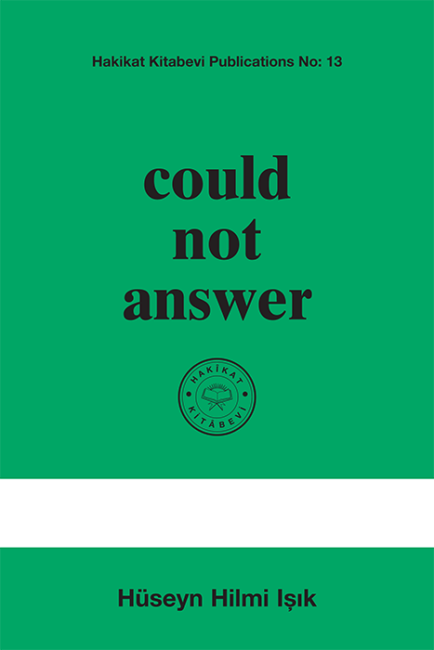The errors, contradictions and interpolations seen in the existing Gospels are uncountably numerous. Many of them are explained in the book Iz-hâr-ul-haqq. Also, there is extensive and detailed information in this respect in books that were written and are still being written and published by a number of German orientalists such as Joizer, Davis, Miel, Kepler, Maçe, Bred Schneider, Griesbach Huge, Lesinag, Herder, Straus, Haus, Tobian, Thyl, Carl Butter, and many others. Here we shall only mention a few of them.
There is a great difference between the Gospels of Matthew and Luke concerning the ancestors of Îsâ ‘sall-allâhu alâ Nebiyyinâ wa alaihi wa sallam’.
In the Gospel of Matthew, the following names are written as the ancestors of Îsâ ‘alaihis-salâm’: “Ibrahim (Abraham), Is-haq (Isaac), Ya’qûb (Jacob), Yahûdâ (Judas), Fâris (Pha’res), Hazron (Es’rom), Irâm (A’ram), Aminadab (A-min’a-dab), Nahshon (Na- as’son), Salmon (Sal’mon), Buaz (Bo’oz), Obid (O’bed), Yesse (Jesse), Dâwûd (David), Suleymân (Solomon), Rehobeam (Ro- bo’am), Abiya (A-bi’a), Asâ (Asa), Yehashafat (Jos’a-phat), Yorâm (Joram), Uzziyâ (O-zi’as), Yotam (Jo’a-tham), Ahaz (A’chaz), Hazkiyâ (Ez-e-ki’as), Manassa (Manas’ses), Amon (A’mon), Yoshiâ (Jo-si’as), Yaqonyâ (Jech-o-ni’as), Shaltoil (Sa- la’thi-el),[1] Zarubâbel (Zo-rob’a-bel), Abihûd (A-bi’ud), Alyâkim (E-li’a-kim), Azor (Azor), Sâdok (Sa’doc), Ahim (A’chim), Elliud (E-li’ud), Eliazar (E-le-a’zar), Mattan (Mat’than), Ya’qûb (Jacob), Yûsuf (Joseph) (Maryam’s husband).” (Matt.: 1-1 thr. 16)
On the other hand, in the twenty-third and later verses of the third chapter of the Gospel of Luke the following names are written: “Târûh (Tha’ra), Ibrâhîm (Abraham), Is-haq (Isaac),
[1] Here, again, like in the Gospel of Luke, sala’thi-el is represented as the father of Zo-rob’a-bel, which is wrong.
Ya’qûb (Jacob), Yahûdâ (Juda), Fâris (Pha’res), Hasron (Es’rom), Arâm (A’ram), Aminadab (A-min’adab), Nahshon (Na-as’son), Salmon (Sal’mon), Buaz (Bo’oz), Obid (O’bed), Yesse (Jesse), Dâwûd (David), Nâtân (Nathan), Mattatha (Mat’ta-tha), Mînân (Me-nan), Milya (Me’le-a), Alyakîm (E-li’a-kim), Yonan (Jo’nan), Yûsuf (Joseph), Yahûdâ (Juda), Sem’ûn (Simeon), Lâvî (Levi), Met-thâd (Mat’that), Yorîm (Jo’rim), Eliazâr (E-li-e’zer), Yushâ (Jo’se), Eyr (Er), Almodam (El-mo’dam), Kosam (Co’sam), Addi (Ad’di), Melkî (Mel’chi), Neyrî (Ne’ri), Shaltoil (Sa-la’thi-el), Zerubâbel (Zo-rob’a-bel), Risa (Rhe’sa), Yuhannâ (Jo-an’na), Yahûdâ (Juda), Yûsuf (Joseph), Shemî (Sem’e-i), Mattathiya (Mat-ta-thi’as), Mahat (Ma’ath), Nâdjay (Nag’ge), Heslî (Es’li), Nahum (Na’um), Amos (Amos), Metasiya (Mat-ta-thi’as), Yûsuf (Joseph), Yannâ (Jan’na), Melkî (Mel’chi), Lâvî (Levi), Met-that (Mat’that), Heli (He’li), Yûsuf (Joseph) (Maryam’s husband).” (Luke: 3-23 thr. 34)
- According to Matthew, Yûsuf (who is said to be the father of Îsâ ‘alaihis-salâm) is the son of Ya’qûb. According to Luke, he is the son of Helî. Matthew is a person close to Îsâ ‘alaihis-salâm’. And Luke is a disciple of Peter’s. They are supposed to be the people to study and observe a person close to them, and yet they seem to fall short of making investigation wholesome enough to write correctly the name of a person who they say was the grandfather of Îsâ ‘alaihis-salâm’; now, who on earth will trust or believe their other narratives?
- According to Matthew, Suleymân ‘alaihis-salâm’ is the son of Dâwûd ‘alaihis-salâm’. And according to Luke the son of Dâwûd ‘alaihis-salâm’ is Nâtân, not Suleymân ‘alaihis-salâm’.
- Matthew says that Shaltoil is the son of Yaqunyâ. But Luke says he is the son of Neyrî. In Matthew, the name of Zerubâbel’s son is Abihûd, whereas in Luke it is Risâ. What is equally startling is that in the nineteenth verse of the third chapter of the Akhbâr-i-eyyâm Safar-i-ûlâ, that is, of the First Chronicles, the names of Ze-rub’ba-bel’s sons are written as Me- shul’lam and Han-a-ni’ah.[1] There is no mention of A-bi’ud or Rhe’sa there.
- According to the seventeenth verse of the first chapter of Matthew, the grandfathers attributed to Îsâ ‘alaihis-salâm’ from Ibrâhîm ‘alaihis-salâm’ to Yûsuf-u-Najjâr (Joseph the Carpenter), make up forty-two generations. The names given above, nevertheless, count only forty. According to Luke’s account, on the other hand, the number reaches fifty-five.
From the time when the Gospels first appeared to our time, Christian scholars have remained in utter perplexity as to this question. Some of them made such untenable explanations as would not be admitted by anyone with common sense. For this reason, scholars such as Eckharn, Keiser, Haisee, Ghabuth, Wither, Fursen, etc. admitted the fact by saying that “These Gospels contain lots of contradictions pertaining to meaning.” This is the truth of the matter. For inconsistencies and errors are not only in this matter but also in all the other matters.
Îsâ ‘alaihis-salâm’ came to this world without a father. Nevertheless, while Jews persistently calumniate him by calling him an illegitimate child [May Allâhu ta’âlâ protect us from saying so!], Christians attribute a paternal case history to him and accept Yûsuf as his father, though he is not his father; this is a consternating ignorance and a paradoxical state. In Qur’ân al- kerîm, the âyats concerning Îsâ ‘alaihis-salâm’ use such terms as “Îsâ ibn Maryam,” which means “Îsâ the son of Maryam.” It is declared clearly in the Qur’ân al-kerîm that Îsâ ‘alaihis-salâm’ did not have a father.
— It is written as follows in the twenty-second and twenty- third verses of the first chapter of Matthew:
To read more about this topic, please proceed to download the book below;
RELATED BOOK ONLINE: COULD NOT ANSWER
CHAPTER : CONTRADICTIONS AND DISCREPANCIES AMONG THE FOUR GOSPELS
PAGE : 66 – 92
